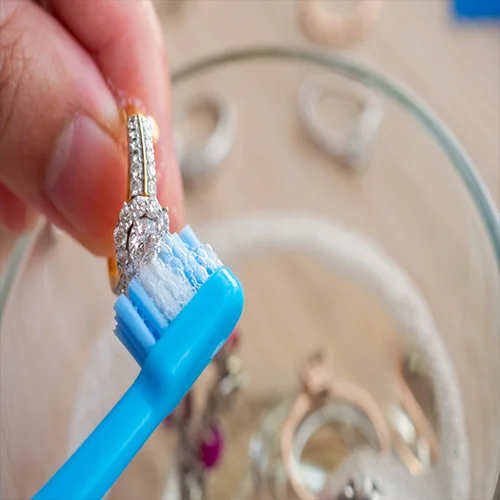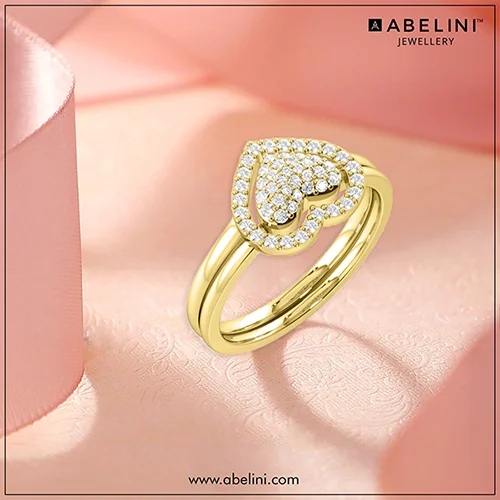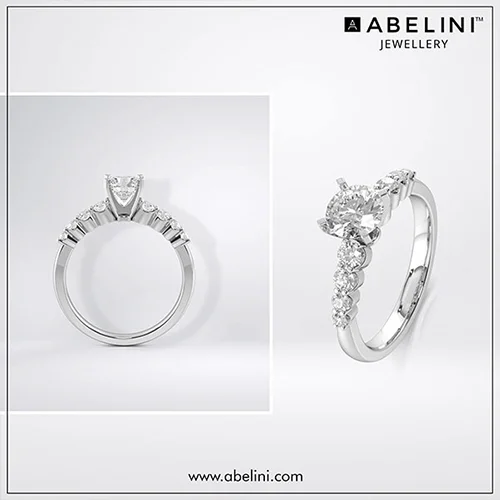Jewellery Care: Preserving Beauty & Protecting Sentiment
The pieces of jewellery we know and love are far, more than simple accessories – as well as valuable in many more ways than the monetary alone.
Ever since the earliest civilisations began to adorn themselves in opulent or meaningful accessories, jewellery has flourished as a treasured aspect of human culture. And today, thousands of years later, our cultures continue to celebrate jewellery in our own, drastically different yet equally passionate practices.
Identity and status, memory and heritage – jewellery is a cultural, economic and historical signifier that represents countless values to countless individuals and societies. Jewellery is at once globally relevant and deeply personal, the basis for turmoil and the embodiment of purest love. So, it is deeply important that we look after the items themselves!
Maintaining the pieces of jewellery we own is the only way to ensure they are enjoyed at their most brilliant throughout our lifetime – as well as passed down in prime condition to bring that same inexplicable joy to our distant descendents.
In today’s Abelini Insights, our passionate jewellery experts will take you on a trip through all you need to know about looking after your beloved pieces of jewellery – as well as debunk some common misconceptions.
So grab yourself a cuppa and settle in…
Cleaning Methods by Material
Certain jewellery cleaning methods are universal, yet beyond basic dusting and swabbing exist specific techniques to apply depending on the gemstone or metal your jewellery features.
Let’s take a look at the popular metals and gemstones you’re likely to be cleaning – then explore some of the unique attentions to pay in order to keep your pieces gleaming as gloriously as the day they arrived in your possession.
Gold
What better place to start than arguably the world’s most popular precious metal, enjoying unanimous renown for its eternal appeal, malleability and durability?
However, over time gold can suffer from exposure to moisture, polluted air and the sorts of chemicals found in body care products.
What to watch out for?
Tarnishing and loss of shine – especially when gold jewellery pieces are not stored properly.
Gold Cleaning
When cleaning gold jewellery and bringing it back to full shine, we recommend soaking the jewellery first in a mild soap then gently scrubbing with a toothbrush or soft bristled brush. You may also like to try to use warm water with ammonia to remove especially reluctant bits of grime.
Whatever you do, avoid harsh chemicals and abrasive materials that can damage the surface of the gold jewellery!
If cleaning a gold jewellery piece featuring gemstones – especially if they are organic gemstone examples – ensure you take extra when cleaning the points at which the two materials join. The setting can be especially sensitive to excessive pressure.
Silver
This enigmatic white metal is celebrated for its relative affordability and versatility within the world of jewellery.
Like gold, silver is alloyed with other metals such as copper to make it strong enough to feature in the daily-wear jewellery designs we know and love.
What to watch out for?
Silver suffers most from tarnishing, which can be made even worse by external factors such as humidity, polluted air and chemicals found in perfume and cream. When tarnished, silver will appear dull and lifeless.
Silver Cleaning
If your silver requires a deeper clean than can be achieved with warm soap and a bristled brush, it’s time to whip out the dedicated silver polish – or the tried and tested household blend of baking soda and aluminium foil.
Still no luck in shifting the tarnish? Then you can try mixing vinegar with your baking soda.
Ensure that once you are done cleaning you rinse the silver jewellery pieces under water, then pat them dry on a flannel to avoid leaving water spots or other unsightly residue!
Gemstones
Now that we’ve covered the two most popular backing metals, let’s consider the colourful elements that so often feature upon them.
Gemstones come in a wide variety of colours, shapes and sizes, each with their own fascinating and unique characteristics. Rubies, sapphires, emeralds… The list is endless. And cared for well, an affordable gemstone can shine just as brightly as some of those most revered examples on the market.
What to watch out for?
Organic gems are more susceptible to damage from chemicals and heat. Indeed, exposure to harsh cleaning agents or extreme temperatures will discolour or begin to physically deteriorate the gemstone.
Gemstone Cleaning
Gemstones such as rubies, sapphires and emeralds are fairly hardy when it comes to the cleaning itself. They will do well with warm soapy water and a soft bristled brush followed by a pat dry with a towel.
However, organic gemstones like pearls, coral and amber require a little bit more of a delicate touch. Just try not to leave them soaking as the water may start to permeate any of these gems’ natural structural inconsistencies.
And with that, let’s take a closer look at the most popular of the organic gemstones:
Pearls
As you no doubt know, whether from your existing forays into organic gemstone jewellery or simply from watching The Little Mermaid, pearls grow within the shells of molluscs like mussels or oysters.
They all begin from a grain of sand, which grows to form its pearl coating as it irritates the internal surface of the mollusc – causing the unhappy invertebrate to coat it in a substance called nacre.
Pearls come in a huge range of shapes and sizes, though natural pearls are certainly the rarest and most valuable. So, if you have a piece of pearl jewellery or other natural, organic jewellery, you must endeavour to look after it with the utmost attention to detail.
What to watch out for?
The organic composition of pearls means they become far more susceptible to damage from chemicals, heat and abrasion in comparison to other, more durable gemstones. These delicate organic gemstones need to be cared for with close consideration.
Pearl Cleaning
Begin by using warm water and a mild, phosphate-free soap. Swirl the pearls gently through the soapy water to remove dirt, then pat dry on a soft and clean cloth – no old, gritty flannels!
Precautions when Cleaning Pearls
- Never use any abrasive brushes or chemical cleaners on pearls
- Avoid exposure to perfume, hairspray and cosmetics
- Store pearls separately from other jewellery as they are especially susceptible to scratching
- Inspect pearl pieces regularly for loose or damaged strands, clasps or settings
If more attentive cleaning is needed, you may wish to invest in a specialist pearl cleaning solution. Or, this may be the point at which you engage a professional pearl jeweller.
Now, onto one of the most valuable gemstones of all – so naturally, it should be maintained with the utmost care:
Diamonds
One of the hardest natural substances known to man, diamonds are every bit as brilliant as they are durable. Formed deep within the Earth’s crust under incredible pressures and temperatures, diamonds are perhaps the world’s favourite precious gemstone. Their appeal is endless, their significance eternal – their proper care essential.
What to watch out for?
Despite their toughness, diamonds can still accumulate and become damaged or tarnished by dirt, oils and other debris. They can also chip or fracture when subject to a strong impact.
Diamond Cleaning
Maintaining the brilliance of your diamond jewellery is easy via regular cleaning with a mild soap and a soft brush.
Unlike softer, organic gemstones like pearls, coral or amber, you can use ultrasonic cleaners on diamonds when you want a more comprehensive clean. However, avoid doing so on any old diamond jewellery that features fragile settings.
Precautions when Cleaning Diamonds
No matter how durable they appear to be, you should never use abrasive brushes or chemicals when cleaning your diamond jewellery. You can permanently damage the setting, metal or gemstone itself.
If you are uncertain about applying excessive pressures to remove a particularly resistant issue, then it may well be time for you to reach out to your local professional diamond cleaner.
Follow the above tips – plus exercise a little caution and common sense – and don’t be afraid to reach out to your friendly local jeweller if you are unsure. Practise these precautions and you’ll be sure to preserve the presence of your jewellery for decades to come.
How To Preserve Diamond Jewellery?
Protect your precious diamond pieces from daily wear and environmental hazards by mindful handling. Remember, tasks like cooking, cleaning, or lounging can expose your jewellery to harm. Here's a concise guide to keeping your jewellery intact:
1. Avoid Contact With Water:
Activities involving water, such as swimming or dishwashing, can harm your diamond jewellery. Ocean salt, pool chlorine, and household chemicals can erode metals and dull gemstones. Moisture can also cause rings to slip off unnoticed.
2. Before Applying Lotions And Perfume:
Applying jewellery after lotions, perfumes, and sprays is crucial, as their chemicals can tarnish metals and cloud gemstones, leading to a lacklustre appearance.
3. Avoid Direct Sunlight:
Direct sun can damage and discolour jewellery. Silver can tarnish, while certain stones like topaz and amethyst may fade. Enjoy the sun, but consider leaving your valued pieces in the shade.
4. Outdoor Activities:
Outdoor Activities: Gardening or beach fun can introduce your jewellery to damaging elements. It's wise to remove them to prevent scratching or embedding dirt.
General Jewellery Care Tips
Now that we’ve covered specifics per metal or gemstone, let’s take a look at some of the general areas of jewellery care that should always be kept in consideration.
Professional Check-ups
Regular check-ups by a professional are essential for ensuring that your jewellery remains in optimal condition.
Why not consider scheduling periodic inspections with a trusted jeweller to identify any potential issues before they compound? Issues such as loose stones, worn prongs or damaged clasps can all be detected and prevented by professionals before they become more serious, costly issues.
Activity Precautions
Always be mindful of wearing jewellery during physical activities that will expose it to risks of potential damage.
It is best to practise removal of precious jewellery whilst carrying out activities like gardening, exercising, showering, washing or swimming. The latter should certainly be avoided due to the chemicals that may be present in the water of the pool.
Likewise, remove jewellery before you apply lotions, perfumes, hairsprays and other self-care products that can actually tarnish and irreparably damage your jewellery items. A tip is to apply make-up, hair spray and perfume before putting on jewellery as the chemicals in these products damage the finish of the precious metal and could also damage the gemstones.
Storage Recommendations
It is mandatory to properly store your jewellery in order to maintain its beauty and integrity. Acquire a jewellery box with separate compartments for different pieces – within those compartments, store your items in soft pouches to protect them further.
You may like to look at anti-tarnish strips when it comes to silver jewellery in particular. Also, store jewellery out of direct sunlight and extreme temperatures – both of which can cause damage over periods of time.
Other Considerations
- Do not ever use toothpaste to clean jewellery.
- Be careful of chlorine. Especially at high temperatures it can permanently damage and discolour jewellery.
- Do not wear gold while using chlorine bleach.
- Do not wear gold while in a swimming pool or hot tub.
Maintenance Practices
When it comes to regular maintenance at home, just consider the following three elements:
Cleaning
Regularly clean your jewellery to remove dirt, oils and residues that can dull its appearance. Use mild soap and lukewarm water for most cleaning, always avoiding harsh chemicals or abrasive cleaners. You can remove everyday buildups of tarnish with jewellery cleaner. After brushing simply rinse with lukewarm water and leave to dry. Always clean earring hooks with an alcohol swab before wearing new earrings. A soft chamois cloth is an effective and inexpensive way to keep jewellery clean and polished.
Polishing
Use a soft, lint-free cloth to gently polish your jewellery and restore its shine. For silver items, try a silver polishing cloth specifically designed to remove tarnish and restore lustre.
Inspections
Periodically inspect your jewellery for signs of wear and tear like loose stones, worn prongs or damaged clasps. Detect potential deterioration fast – and solve it before it becomes a real issue.
Keep these general jewellery care tips in mind at all times – even when you know that it is a while until the next bout of attention is due – and you’ll be sure to keep your beloved items gleaming for the rest of time. There are a number of commercial cleaning products available in your local supermarket to clean jewellery available.
Common Misconceptions or Myths About Jewellery Care
Here at Abelini, we hear a lot of opinions when it comes to jewellery care. Some of what we hear is spot on – others not so much!
So, we thought we’d gather some of the most common jewellery care myths we hear – to save you the trouble of pursuing them only to find out they’re pointless. Stick with us and we’ll save your time and effort to spend on what you love doing in life – especially if it’s jewellery-related!
“Professional jewellery cleaning isn’t worth it.”
Sure, DIY jewellery care will work for surface maintenance of a piece of jewellery in good condition. But when it comes to dismantling and adjusting using specialist tools to conduct a deeper clean, you will want your valuables in the hands of a maestro.
“All jewellery can be cleaned the same way!”
Sure, warm soapy water and a soft bristled brush or gentle cloth will be fine for washing sturdy gold and silver pieces – but what about pearls, coral and other far more delicate organic gemstones? Pay close attention to proper treatment if you want to avoid damaging delicate pieces!
“Storing jewellery in the bathroom’s totally fine…”
Sure, it’s fine to leave your earrings on the bathroom counter when you get back from a night out and put them away in the morning – but you don’t want to be keeping valuable pieces of jewellery lying around in the bathroom for extended periods. The temperature and humidity fluctuations will accelerate dullness, tarnishing and rust.
“Just use hot water and toothpaste!”
Sure, this can work – however, we would not recommend this for any piece that exhibits real monetary or sentimental value. When it comes to pearls, opals and other softer gemstones, the last thing you want is to cause thermal shock from hot water or abrasive damage from textured toothpaste.
“Go swimming with it on, nothing will happen to it!”
Sure, don’t beat yourself up if you accidentally go for a dip without remembering to take off your jewellery. However, repeated exposure to water – whether chlorinated or saltwater – will certainly cause damage over time. It can weaken settings, tarnish metals and cause gemstones to deteriorate at certain rates.
What jewellery maintenance myth have you believed in the past? Let us know and we’ll add it to our list!
Jewellery Care: Preserving Beauty & Protecting Sentiment
So there we have it – a blend of careful consideration and common sense, of proactively preventing damage with consistent attention. Once you get into the habit, it takes no time or effort at all – and your future self (and descendents) will thank you for it.
A 2-minute clean here and there, a visit to your local professional jeweller every 6-12 months – this is the recipe for affordable, dependable care of your valuable jewellery pieces.
Take the time to understand the intricacies of the upkeep your specific gemstones or metal require. Immerse yourself in the composition of your jewellery so that you are quick to notice potential issues and passionate about resolving them before they snowball into serious issues.
If you have any general jewellery care queries or would like to book in your jewellery for professional maintenance, reach out today. Our attentive team of jewellers can’t wait to assist you.
FAQs
Minimise wear and regularly soak in a solution of warm water and mild dish soap. Use a soft brush for cleaning, especially behind the diamond, and air dry on a lint-free cloth. For thorough care, have a jeweller inspect and clean your pieces every six months to a year.
White gold may yellow over time due to skin contact and environmental factors. To restore its colour, have it rhodium-plated by a professional. This not only revives its shine but also extends its durability.
Store diamonds separately in a dry, compartmentalised box to prevent scratches or damage. This method ensures their preservation and keeps them safe from harsh elements.
It's best to remove diamond jewellery before sleeping to avoid unnecessary wear from pressure and body heat, helping to maintain its condition and longevity.





